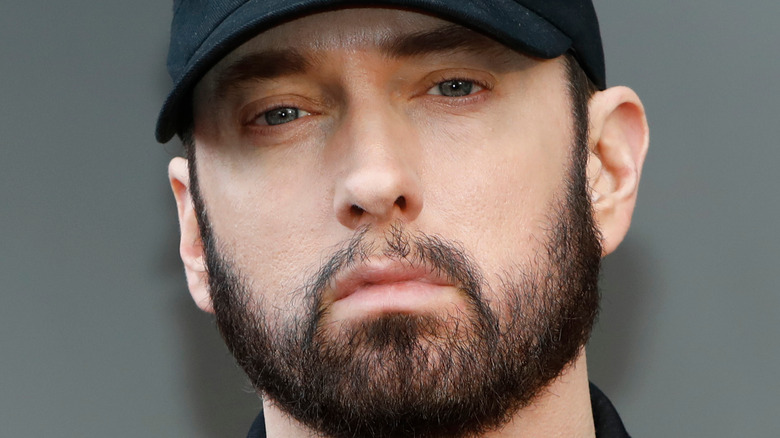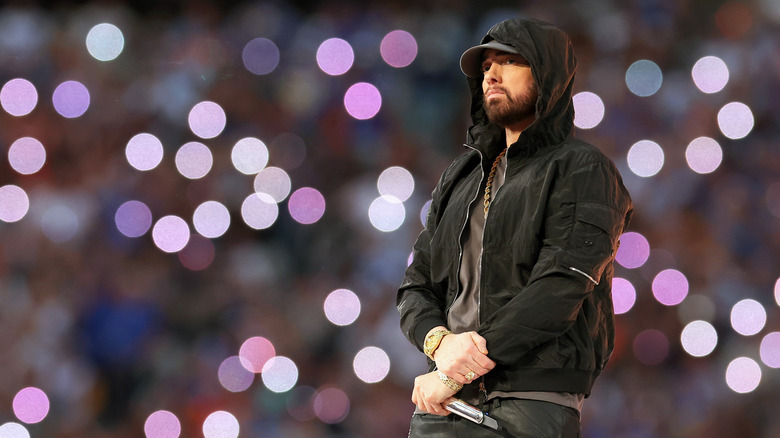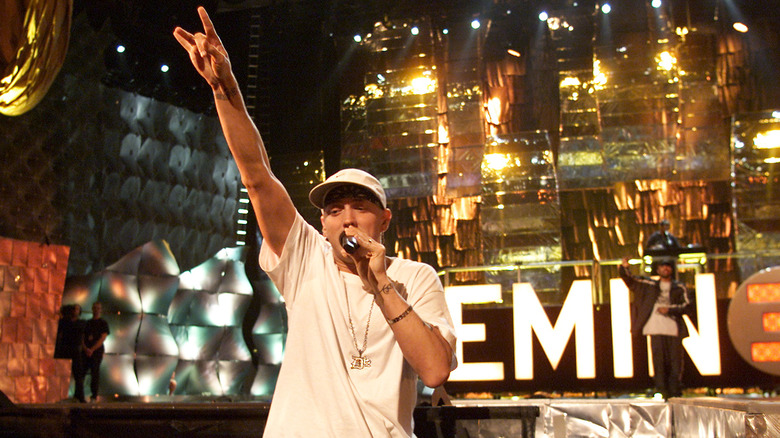The Reason Eminem Sued Universal Music
Eminem, actual name Marshall Mathers, is no stranger to controversy — or the courtroom, for that matter. Throughout his illustrious career, he has been sued by many people — including his mother, ex-wife, and even his childhood bully (via The Source) — and came out the other side relatively unscathed. However, one of his lesser-known legal battles began in 2009 and involved producers of Eminem's music taking on the goliath-sized Universal Music Group in a dispute over unpaid royalties (via The Guardian).
Although it was primarily carried out on Eminem's behalf, this legal conflict is a fascinating slice of music history as it highlights the anxieties that many Western musical artists had at the time about being paid fairly during the advent of music streaming. Whether it be Lars Ulrich's notorious court case against Napster users or the rise of the iTunes library, the 2000s music industry reflects a time when astronomically successful musicians had no qualms about lawyering up and bearing their fangs to get their money's worth.
Yet, this lawsuit surrounding Eminem and Universal Music Group was the first of its kind and foreshadows many of the challenges and ethical quandaries that musicians face today surrounding online streaming and the struggle to collect their fair share of royalties. As many aspiring musicians throughout the world demand more than a pittance from music streaming services, behemoth companies such as Spotify or Pandora continue to generate colossal profits from this lopsided business model (via Musician Wave). So, with this in mind, let's discuss the case.
The Context of the Case
Although the motion for this lawsuit was first filed in 2007, it would be another full two years before it even reached a courtroom (per Rolling Stone). Even back then, Eminem was a household name and one of hip-hop's biggest-selling artists. Today, he holds the distinction of being the best-selling rapper of all time, with 11 studio albums that have sold over 220 million copies worldwide as of 2019 (per The Sydney Morning Herald).
Before his meteoric rise, Eminem was discovered and signed by Jeff and Mark Bass, two brothers and producers, back in 1995. The siblings saw something special in Eminem's music and signed him to their label, F.B.T. Productions (per The Wrap). Although Eminem would eventually reach the big leagues in the early 2000s after collaborating closely with Dr. Dre, both siblings were instrumental in getting Marshall Mathers' career off the ground and continued to work with him throughout his career.
Simultaneously, in the early 2000s, iTunes and music streaming were blossoming, thanks in part to the ubiquity of home computers and the rise of online music libraries (via CNN). As a result, major record labels were making a killing off this innovative method of consuming music, to the chagrin of many artists.
A Quick Crash Course on Music Royalties
To stave off any potential confusion, it's vital to clarify how music royalties were distributed at the time, and how such arrangements could have easily led to such complex legal conflicts over money. Universal Music owned the majority of Eminem's royalties at the time of the lawsuit. In the music industry, contracts between an artist and publishers or record labels frequently distinguish between "music sales" and "music licensing," per The Guardian. These distinctions matter because they decide how much of the cake Eminem gets.
For instance, if a "sale" occurred, such as when a fan purchased an Eminem CD, Universal Music Group would keep over 80% of the sale (via The Wrap), while Eminem would receive only 12%, with the remainder shared elsewhere (per The New York Times). Before signing with a record label, an artist normally agrees on a "distribution" arrangement like this, which often pays them a lower royalty payout for song sales. However, when an artist's music is "licensed" — that is, not disseminated as a sale but rather used by someone in exchange for a fee — they receive a larger share of the royalties. According to The New York Times, this meant that Eminem would receive 50% of the royalties stake every time his song was licensed.
When the digital music boom surged in the early 2000s, however, it posed a unique legal dilemma for many labels and their artists. On the one hand, music labels had no idea digital streaming would become so popular. But on the other hand, artists had royalty contracts in place long before digital sales ever happened, which is why F.B.T. Productions filed the lawsuit, per The Guardian.
The Outcome of the Case
The crux of F.B.T Productions', Eminem's, and their lawyers' argument was this: Digital royalties made from downloads should be considered ”licensing” royalties, and as such, the artist deserved a greater cut of the profits. They claimed that the Universal Music Group had withheld $1.3 million in sales from them and sought reparations for these unpaid royalties (via Insider). However, the Universal Music Group contested that these iTunes downloads fell under ”sales” and said it should pay lower royalties to Eminem, per The Guardian. This legal case caught the attention of many major media outlets at the time, and even Steve Jobs was brought in via video link to weigh on where he considered an iTunes download to fit into the complexities of music licensing laws (per Insider).
In March 2009, the case was initially decided in favor of the Universal Music Group. However, F.B.T. Promotions wasn't afraid to fight this decision and bring the case to multiple courts across the land. At one point, it seemed like it would even land on the laps of the Supreme Court, although it declined to judge the case (via CBS News). According to The Wrap, the U.S. Court of Appeals sided with the Bass brothers and Eminem in 2010 and deemed a digital download to be more akin to a licensing of a recording, and as such, the artist was eligible for the 50% royalty rate. Therefore, Eminem and the F.B.T Promotions publishing company were owed unpaid royalties from Universal Music.
The Aftermath
After five years of stressful and protracted court battles, the issue was ultimately addressed — Universal Music and F.B.T. Promotions (who represented Eminem) struck an out-of-court settlement for an undisclosed sum in 2012 in a manner that suited both parties. (via Billboard). This ruling, however, opened the door for other musicians who felt they were entitled to similar unpaid royalties, and as a result, a slew of artists like Weird Al Yankovic, Public Enemy, Rick James, The Temptations, and even Kenny Rogers all lawyered up and prepared for battle shortly afterward.
Even a decade later, this problem remains contentious between performers and labels, with a recent case across the pond closely mirroring the Eminem case. Four Tet, a pioneering electronic artist from the U.K., successfully sued his label, Domino Records, in 2021 for his fair share of streaming royalties (via Rolling Stone). As technology inevitably changes the landscape of how we digitally digest art, it appears that cases like these may become more commonplace as artists — particularly independent artists — strive for fairer compensation for their work.




